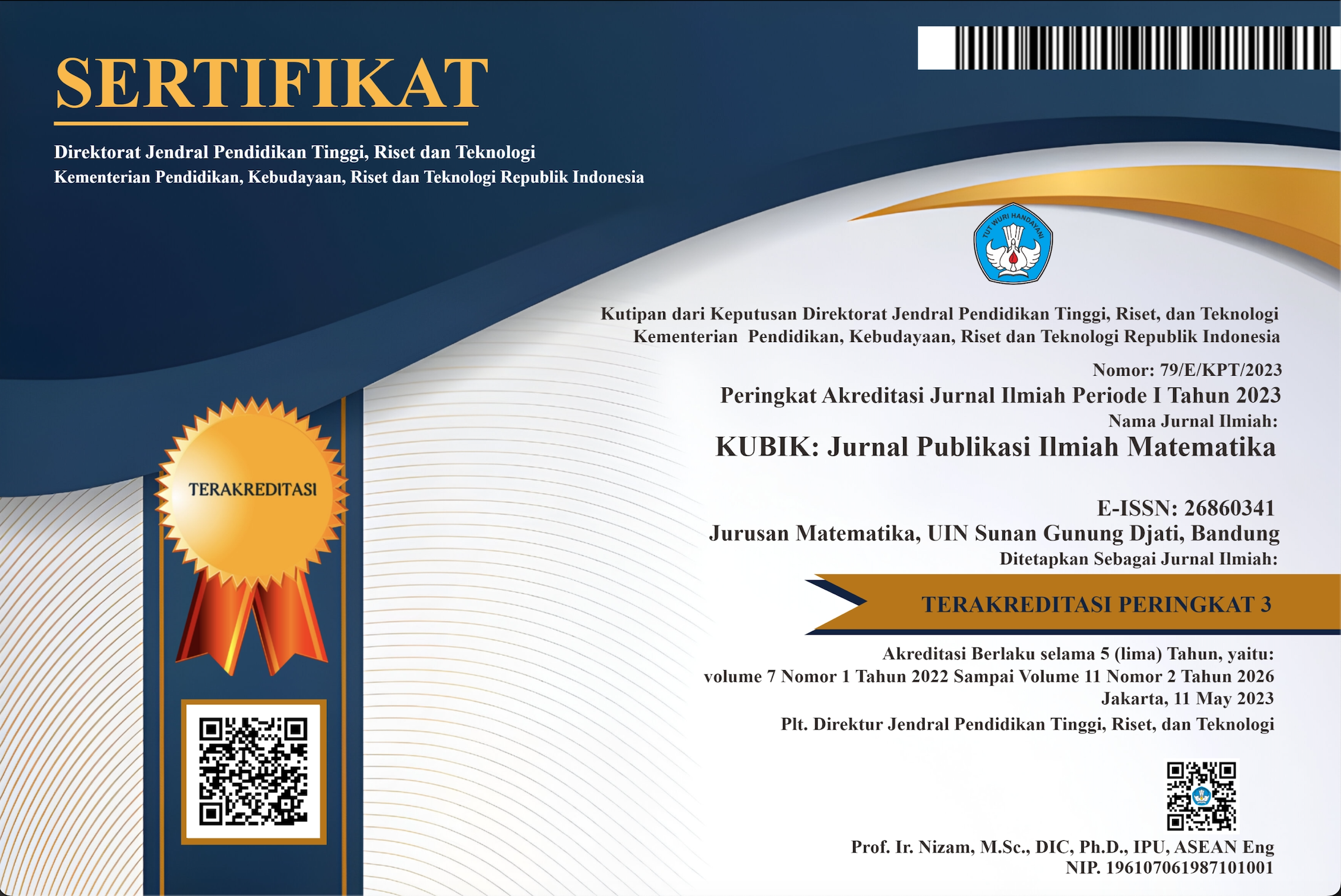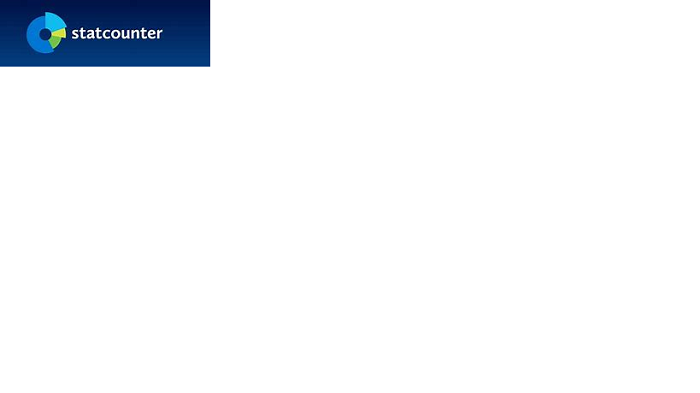- Focus and Scope
- Section Policies
- Peer Review Process
- Open Access Policy
- Archiving
- Publication Ethics (Etika Publikasi)
- Author Fees
- Fast Track Review
- Plagiarism Check
Focus and Scope
KUBIK: Jurnal Publikasi Ilmiah Matematika contains scientific studies of:
- Fuzzy Systems and their Applications
- Geometry Theories and their Applications
- Graph Theories and their Applications
- Real Analysis and its Applications
- Operations Research and its Applications
- Statistical Theories and their Applications
- Dynamical Systems and their Applications
- Mathematical Modeling and its Applications
- Discrete Mathematics and their Applications
- Computer Science and its Applications
- Actuarial Mathematics and its Applications
Section Policies
Articles
Peer Review Process
Paper submitted in KUBIK: Jurnal Publikasi Ilmiah Matematika will be reviewed by some experts in Mathematics from several universities. It will take for about a month to conduct the review. Every paper submitted will be scanned for plagiarism before it is sent to the reviewers.
To be published in this Journal, a paper should meet the following requirements:
- The review process is using a Double Blind Review, so the reviewer does not know the identity of the author, and the author does not know the identity of the reviewer.
- The paper submitted in the journal must be original, unpublished work, and not under consideration for publication elsewhere.
- Provides strong evidence or proof for its conclusions.
- Should be a research result or literature review in the mathematics field.
- Ideally, interesting to researchers in mathematics field and other related disciplines
In general, to be acceptable, a paper should represent an advance in understanding and influences thinking in the field of study. There should be a strong reason why the work deserves to be published in KUBIK: Jurnal Publikasi Ilmiah Matematika.
Open Access Policy
This journal provides immediate open access to its content on the principle that making research freely available to the public supports a greater global exchange of knowledge.
Archiving
This journal utilizes the LOCKSS system to create a distributed archiving system among participating libraries and permits those libraries to create permanent archives of the journal for purposes of preservation and restoration. More...
Publication Ethics (Etika Publikasi)
Kubik: Jurnal Publikasi Ilmiah Matematika is a peer-reviewed electronic national journal. This statement clarifies the ethical behavior of all parties involved in the act of publishing an article in this journal, including the author, the chief editor, the editorial board, the peer-reviewer, and the publisher (Mathematics Department of Sunan Gunung Djati State Islamic University Bandung). This statement is based on COPE’s Best Practice Guidelines for Journal Editors.
Ethical Guideline for Journal Publication
The publication of an article in a peer-reviewed KUBIK: Jurnal Publikasi Ilmiah Matematika is an essential building block in the development of a coherent and respected network of knowledge. It is a direct reflection of the quality of the work of the authors and the institutions that support them. Peer-reviewed articles support and embody the scientific method. It is therefore important to agree upon standards of expected ethical behavior for all parties involved in the act of publishing: the author, the journal editor, the peer reviewer, the publisher, and the society.
As a publisher of pure and applied mathematics journals, we take our duties to back up all stages of publishing seriously and we recognize our ethical and other responsibilities. We are committed to ensuring that advertising, reprint, or other commercial revenue has no impact or influence on editorial decisions.
Publication decisions
The editor of KUBIK: Jurnal Publikasi Ilmiah Matematika is responsible for deciding which articles submitted to the journal should be published. The validation of the work in question and its importance to researchers and readers must always drive such decisions. The editors may be guided by the policies of the journal's editorial board and constrained by such legal requirements as shall then be in force regarding libel, copyright infringement, and plagiarism. The editors may confer with other editors or reviewers in making this decision.
Fair Play
An editor at any time evaluates manuscripts for their intellectual content without regard to race, gender, sexual orientation, religious belief, ethnic origin, citizenship, or political philosophy of the authors.
Confidentiality
The editor and any editorial staff must not disclose any information about a submitted manuscript to anyone other than the corresponding author, reviewers, potential reviewers, other editorial advisers, and the publisher, as appropriate.
Any manuscripts received for review must be treated as confidential documents. They must not be shown to or discussed with others except as authorized by the editor.
Disclosure and conflicts of interest
Unpublished materials disclosed in a submitted manuscript must not be used in an editor's own research without the express written consent of the author.
Contribution to Editorial Decisions
Peer review assists the editor in making editorial decisions and the editorial communications with the author may also assist the author in improving the paper.
Promptness
Any selected referee who feels unqualified to review the research reported in a manuscript or knows that its prompt review will be impossible should notify the editor and excuse himself from the review process.
Standards of Objectivity
Reviews should be conducted objectively. Personal criticism of the author is inappropriate. Referees should express their views clearly with supporting arguments.
Acknowledgment of Sources
Reviewers should identify relevant published work that has not been cited by the authors. Any statement that an observation, derivation, or argument had been previously reported should be accompanied by the relevant citation. A reviewer should also call to the editor's attention any substantial similarity or overlap between the manuscript under consideration and any other published paper of which they have personal knowledge.
Disclosure and Conflict of Interest
Privileged information or ideas obtained through peer review must be kept confidential and not used for personal advantage. Reviewers should not consider manuscripts in which they have conflicts of interest resulting from competitive, collaborative, or other relationships or connections with any of the authors, companies, or institutions connected to the papers.
Reporting standards
Authors of reports of original research should present an accurate account of the work performed as well as an objective discussion of its significance. Underlying data should be represented accurately in the paper. A paper should contain sufficient detail and references to permit others to replicate the work. Fraudulent or knowingly inaccurate statements constitute unethical behavior and are unacceptable.
Data Access and Retention
Authors are asked to provide the raw data in connection with a paper for editorial review, and should be prepared to provide public access to such data (consistent with the ALPSP-STM Statement on Data and Databases), if practicable, and should in any event be prepared to retain such data for a reasonable time after publication.
Originality and Plagiarism
The authors should ensure that they have written entirely original works, and if the authors have used the work and/or words of others that this has been appropriately cited or quoted.
Multiple, Redundant, or Concurrent Publication
An author should not in general publish manuscripts describing essentially the same research in more than one journal or primary publication. Submitting the same manuscript to more than one journal concurrently constitutes unethical publishing behavior and is unacceptable.
Acknowledgment of Sources
Proper acknowledgment of the work of others must always be given. Authors should cite publications that have been influential in determining the nature of the reported work.
Authorship of the Paper
Authorship should be limited to those who have made a significant contribution to the conception, design, execution, or interpretation of the reported study. All those who have made significant contributions should be listed as co-authors. Where there are others who have participated in certain substantive aspects of the research project, they should be acknowledged or listed as contributors. The corresponding author should ensure that all appropriate co-authors and no inappropriate co-authors are included in the paper and that all co-authors have seen and approved the final version of the paper and have agreed to its submission for publication.
Disclosure and Conflicts of Interest
All authors should disclose in their manuscript any financial or other substantive conflicts of interest that might be construed to influence the results or interpretation of their manuscript. All sources of financial support for the project should be disclosed.
Fundamental errors in published works
When an author discovers a significant error or inaccuracy in his/her own published work, it is the author’s obligation to promptly notify the journal editor or publisher and cooperate with the editor to retract or correct the paper.
Author Fees
This journal charges the following author fees.
Article Submission: USD 0 or 0 (IDR)
Authors are not required to pay an Article Submission Fee as part of the submission process to contribute to review costs.
Article Publication: USD 70 or 800.000,00 (IDR)
The fee for publication of original papers in this journal is USD 70.00 (for abroad Authors) or IDR 800.000,00 (for local Authors). If the paper is accepted for publication, you will be asked to fill out and send statement of originality and you will be asked to pay the fee. Accepted manuscripts will not be published until payment has been received. The mode of payment is through Direct Deposit from any bank to our bank account. After completing the payment, please upload the proof of payment using the provided link https://forms.gle/VzgRaHmcQcorQ3qD6
Seabank
901632844959
Salwa Nursyahida
Fast Track Review
Fast Track review is a service aimed at expediting the review process within KUBIK: Jurnal Publikasi Ilmiah Matematika. This service incurs a fee of IDR 500.000,00, but it is important to note that payment does not guarantee acceptance of the manuscript. The decision of the review will be communicated by the editor within a maximum of 7 working days to the author. Article processing will commence upon receipt of payment. KUBIK: Jurnal Publikasi Ilmiah Matematika provides this optional service with the goal of assisting authors in obtaining certainty regarding the publication status of their manuscripts. To avail of this service, please contact us via email: fahrudin.math@uinsgd.ac.id.
Plagiarism Check
Plagiarism screening will be conducted by KUBIK Editorial Board using Turnitin software.















